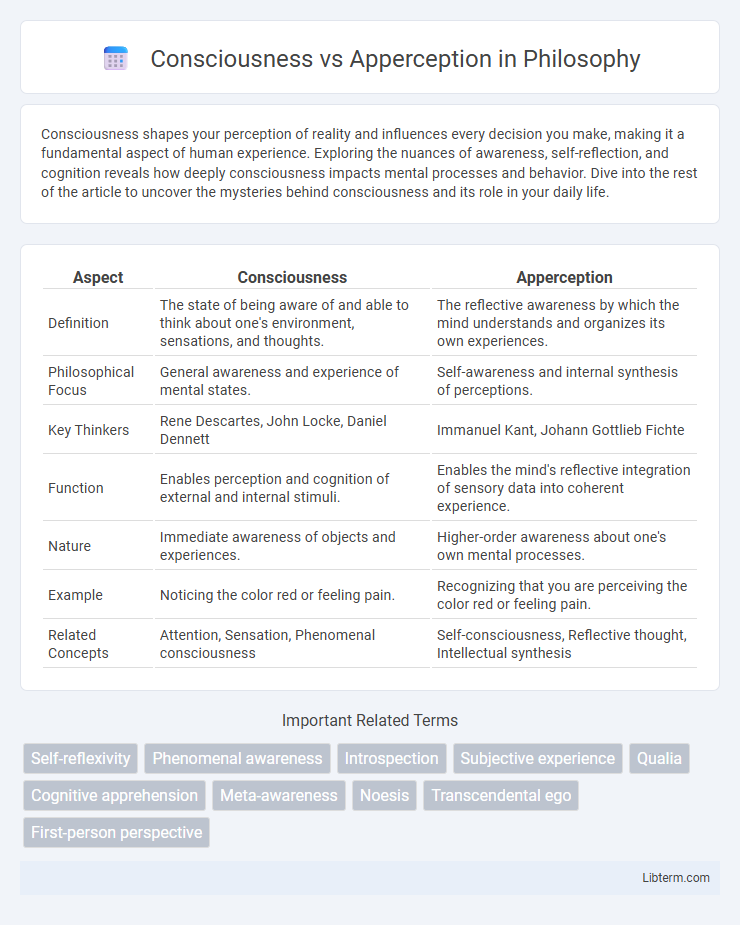Consciousness shapes your perception of reality and influences every decision you make, making it a fundamental aspect of human experience. Exploring the nuances of awareness, self-reflection, and cognition reveals how deeply consciousness impacts mental processes and behavior. Dive into the rest of the article to uncover the mysteries behind consciousness and its role in your daily life.
Table of Comparison
| Aspect | Consciousness | Apperception |
|---|---|---|
| Definition | The state of being aware of and able to think about one's environment, sensations, and thoughts. | The reflective awareness by which the mind understands and organizes its own experiences. |
| Philosophical Focus | General awareness and experience of mental states. | Self-awareness and internal synthesis of perceptions. |
| Key Thinkers | Rene Descartes, John Locke, Daniel Dennett | Immanuel Kant, Johann Gottlieb Fichte |
| Function | Enables perception and cognition of external and internal stimuli. | Enables the mind's reflective integration of sensory data into coherent experience. |
| Nature | Immediate awareness of objects and experiences. | Higher-order awareness about one's own mental processes. |
| Example | Noticing the color red or feeling pain. | Recognizing that you are perceiving the color red or feeling pain. |
| Related Concepts | Attention, Sensation, Phenomenal consciousness | Self-consciousness, Reflective thought, Intellectual synthesis |
Defining Consciousness: Core Concepts
Consciousness refers to the state of being aware of and able to think about one's own existence, sensations, thoughts, and environment, encompassing subjective experiences and self-awareness. Apperception involves the mind's active process of interpreting and assimilating sensory information into existing cognitive frameworks, enabling deeper understanding and integration of experiences. Core concepts defining consciousness include phenomenal awareness, intentionality, and the unity of perception, distinguishing it from apperception's focus on cognitive synthesis and reflective thought.
Apperception Explained: Beyond Simple Awareness
Apperception refers to the process by which the mind actively organizes and interprets sensory input, transforming mere awareness into a coherent understanding of experiences. It involves the integration of past knowledge, attention, and self-reflection, enabling individuals to perceive not just stimuli but their significance within a broader context. Unlike basic consciousness, which denotes simple sensory awareness, apperception emphasizes cognitive engagement and meaningful mental assimilation.
Historical Perspectives on Consciousness and Apperception
Historical perspectives on consciousness and apperception reveal foundational distinctions rooted in early philosophy and psychology. Immanuel Kant emphasized apperception as the self-aware aspect of consciousness that unifies experiences, while John Locke focused on consciousness as the direct awareness of sensations and thoughts. These differing views influenced later theories, with apperception often linked to active mental synthesis and consciousness to passive awareness.
The Neuroscience Behind Conscious Experience
Neuroscience reveals that consciousness arises from integrated neural networks in the cerebral cortex, enabling subjective awareness and sensory perception. Apperception involves higher-order cognitive processes, where the brain not only receives sensory input but actively interprets and organizes these stimuli to form coherent, meaningful experiences. Functional MRI studies highlight the role of the prefrontal cortex in apperceptive processing, distinguishing it from basic conscious states governed by primary sensory areas.
Apperception in Psychological Theory
Apperception in psychological theory refers to the process by which new experiences are assimilated and interpreted through the lens of existing mental frameworks, enabling a deeper understanding of sensory input. This concept highlights the active role of the mind in organizing perceptions, going beyond passive consciousness to involve attention, reflection, and meaning-making. Apperception is central to cognitive development theories, emphasizing how individuals construct knowledge by integrating new information with prior knowledge.
Comparing Levels of Awareness: Consciousness vs Apperception
Consciousness refers to the general state of being aware of and able to perceive one's environment, thoughts, and sensations, forming the foundation of cognitive experience. Apperception involves a higher level of awareness where the mind actively interprets and integrates sensory information with prior knowledge, enabling self-reflection and complex understanding. While consciousness provides raw experiential data, apperception organizes and makes sense of this information, highlighting the cognitive processes that differentiate mere awareness from meaningful perception.
Cognitive Processes Influencing Apperception
Cognitive processes influencing apperception include attention, memory, and prior knowledge, which shape how sensory information is integrated into conscious experience. Apperception involves the active interpretation and assimilation of new stimuli based on existing mental frameworks, distinguishing it from mere passive consciousness. Neural mechanisms such as executive function and working memory contribute to the dynamic organization and meaning-making of perceived data within apperceptive processes.
Practical Implications in Mindfulness and Self-Reflection
Consciousness involves the immediate awareness of thoughts and sensations, while apperception refers to the reflective process of integrating those experiences into self-understanding. In mindfulness practice, cultivating consciousness enhances present-moment awareness, whereas apperception deepens self-reflection by enabling recognition of patterns and emotional responses. This distinction informs strategies for mental health, promoting greater emotional regulation and cognitive clarity through balanced awareness and introspective analysis.
Challenges in Measuring Consciousness and Apperception
Measuring consciousness presents significant challenges due to its subjective nature and the difficulty in objectively quantifying internal experiences. Apperception, as the process of self-awareness and the integration of perceptions into a coherent mental framework, adds complexity by involving higher-order cognitive functions that are less directly observable. Scientific efforts rely on neuroimaging, behavioral analysis, and computational models, yet capturing the dynamic interplay between raw sensory input (consciousness) and reflective awareness (apperception) remains an ongoing obstacle in cognitive neuroscience.
Future Directions in Consciousness and Apperception Research
Future directions in consciousness and apperception research emphasize integrating neuroimaging techniques with computational models to map dynamic brain processes underlying subjective experience. Advances in artificial intelligence and machine learning enable the identification of neural correlates associated with apperceptive awareness, fostering novel approaches to understanding self-reflective cognition. Expanding interdisciplinary collaboration between cognitive neuroscience, philosophy, and computational science promises to refine definitions of consciousness and apperception while generating empirical frameworks for evaluating conscious states.
Consciousness Infographic

 libterm.com
libterm.com